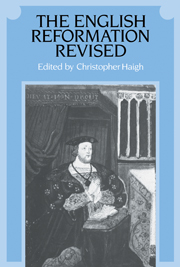Book contents
- Frontmatter
- Contents
- List of illustrations
- Acknowledgements
- Preface
- List of abbreviations
- Introduction
- 1 The recent historiography of the English Reformation
- 2 Church courts and the Reformation in the diocese of Chichester, 1500–58
- 3 Anticlericalism and the English Reformation
- 4 The Henrician Reformation and the parish clergy
- 5 Popular reactions to the Reformation during the years of uncertainty, 1530–70
- 6 The local impact of the Tudor Reformations
- 7 Revival and reform in Mary Tudor's Church: a question of money
- 8 Bonner and the Marian persecutions
- 9 The continuity of Catholicism in the English Reformation
- Conclusion
- Index
3 - Anticlericalism and the English Reformation
Published online by Cambridge University Press: 20 January 2010
- Frontmatter
- Contents
- List of illustrations
- Acknowledgements
- Preface
- List of abbreviations
- Introduction
- 1 The recent historiography of the English Reformation
- 2 Church courts and the Reformation in the diocese of Chichester, 1500–58
- 3 Anticlericalism and the English Reformation
- 4 The Henrician Reformation and the parish clergy
- 5 Popular reactions to the Reformation during the years of uncertainty, 1530–70
- 6 The local impact of the Tudor Reformations
- 7 Revival and reform in Mary Tudor's Church: a question of money
- 8 Bonner and the Marian persecutions
- 9 The continuity of Catholicism in the English Reformation
- Conclusion
- Index
Summary
Thinking is a difficult business, and most of us prefer to do as little of it as possible. To avoid the anguish and responsibility of independent thought, we explain the past with historical clichés, we play with labels rather than grapple with the complexities of detail. We rely upon ‘the decay of medieval religion’, ‘the growth of an articulate laity’, ‘the rise of Lollardy’ and ‘the dynamic impact of Protestantism’ for an exposition of the origins of the English Reformation. But such categories are only the convenience-foods of historical study, which give us our past pre-packaged and frozen, in ready-mixed meals needing only to be warmed in the moderate oven of a mediocre essay or lecture: with such fast-foods to hand, the over-worked cook need not formulate his own recipe or cope with his own ingredients. These concepts are sometimes no more than convenient fictions, which survive not because the evidence justifies them but because they are the necessary foundations for a conventional interpretation.
‘Anticlericalism’ is just such a fiction, and owes its popularity to utility not veracity: G. G. Coulton argued seventy years ago that the clergy must have been unpopular or the Reformation would be inexplicable. The need to explain the Protestant outcome of the English Reformation imposes a perspective which finds in ‘anticlericalism’ both a cause of religious change and a reason for its acceptance.
- Type
- Chapter
- Information
- The English Reformation Revised , pp. 56 - 74Publisher: Cambridge University PressPrint publication year: 1987
- 11
- Cited by



